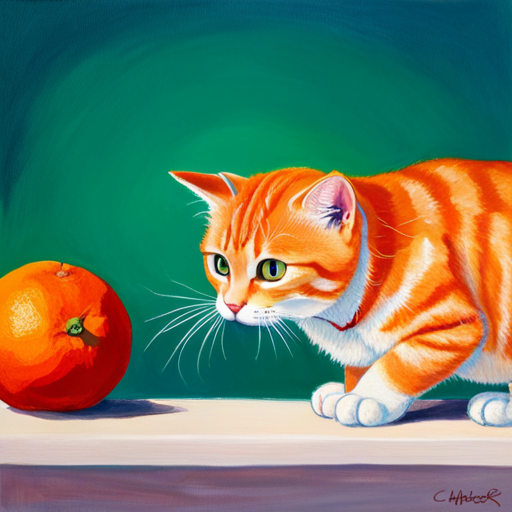Imagine you’re enjoying a juicy tangerine, and your cat seems intrigued by the sweet aroma. You might wonder if sharing a small piece with them is safe. While tangerines aren’t toxic to cats, they’re not the ideal treat for your feline friend.
Citrus fruits can cause gastrointestinal upset in some cats, and the essential oils in the peel are particularly problematic. But before you decide to share that slice of tangerine, there’s more to consider about how it might affect their health.
Let’s explore why moderation and caution are key, and what alternatives might be safer for satisfying their curiosity.
Key Takeaways
- Tangerines contain toxic essential oils and compounds that can be harmful to cats.
- The high sugar content in tangerines can lead to obesity and diabetes in cats.
- Feeding cats tangerines can cause stomach upset and potential allergic reactions.
- Tangerines should be offered in minimal amounts, if at all, to avoid health risks.
Understanding Feline Nutrition
To properly care for your cat, it’s crucial to understand their unique nutritional needs, which differ significantly from those of humans. At the core of feline health is hydration importance. Cats naturally derive a significant amount of their water intake from their diet, especially if they consume a high moisture, primarily wet food diet. This aspect of their nutrition is essential, as cats aren’t as efficient at staying hydrated through drinking water alone. Ensuring your cat has constant access to fresh water, alongside a moisture-rich diet, can prevent dehydration and support overall health.
Additionally, cats require a diet high in protein sources. They’re obligate carnivores, meaning their bodies are designed to thrive on nutrients found in animal products. Protein supports everything from muscle maintenance to a healthy immune system in cats. It’s critical to select high-quality, animal-based proteins for their meals, as these provide the amino acids essential to feline health. Plant-based proteins, on the other hand, may lack some of these crucial amino acids and thus, shouldn’t be a primary protein source in a cat’s diet. Prioritizing these dietary fundamentals ensures your cat receives the balanced nutrition needed for a healthy life.
The Appeal of Tangerines
While understanding feline nutrition is fundamental, it’s also important to consider the safety of specific foods, such as tangerines, that may pique your cat’s curiosity. The appeal of tangerines to humans is largely due to their sweet, tangy flavor and the ease with which they can be incorporated into various dishes. However, when it comes to your feline friends, the attraction mightn’t be as straightforward.
Tangerine flavor is distinctive, a product of centuries of citrus cultivation. This cultivation has led to the development of a fruit that’s not only rich in vitamins for humans but also emits a strong, enticing aroma. It’s this aroma that can attract cats, despite their typically meat-centric dietary preferences. Yet, it’s crucial to approach this curiosity with caution.
Understanding the appeal of tangerines involves recognizing both the sensory experience they offer and the historical context of citrus cultivation. While these fruits are a testament to human agricultural achievement, their place in a cat’s diet must be considered with an eye toward safety and nutritional appropriateness. As you navigate your cat’s interest in such foods, keeping their well-being at the forefront is essential.
Potential Health Risks
Despite their appealing scent, tangerines pose potential health risks to cats that owners should be aware of. The consumption of tangerines can expose your feline friend to toxic compounds not easily processed by their digestive system. This can lead to a variety of health concerns that, as a responsible pet owner, you’d want to avoid.
When considering whether to share this citrus fruit with your cat, it’s crucial to be aware of the potential dangers:
- Toxic Essential Oils: Tangerines contain essential oils that are toxic to cats, potentially leading to symptoms like vomiting and diarrhea.
- Digestive Issues: The acidic nature of tangerines can upset your cat’s stomach, causing discomfort or more severe gastrointestinal problems.
- Possible Allergic Reactions: Just like humans, cats can have allergic reactions to foods, including tangerines, which may manifest as skin irritations or more severe symptoms.
- Interference with Metabolism: Certain compounds in tangerines can interfere with the metabolism of other substances, potentially leading to toxicity.
- Risk of Obesity and Diabetes: The high sugar content in tangerines can contribute to obesity and diabetes in cats, especially if consumed in large quantities.
Staying informed and cautious can help you make the best dietary choices for your cat, ensuring their health and happiness.
Safe Feeding Practices
Considering the risks associated with feeding tangerines to cats, it’s crucial to adhere to safe feeding practices to protect your pet’s health. First and foremost, it’s essential to understand that tangerines should only be offered in minimal amounts. This is because the natural sugars and acids found in tangerines can lead to digestive upset in cats. When considering introducing tangerines to your cat’s diet, start with a tiny piece to gauge their reaction.
Monitoring your cat’s reaction closely in the hours following ingestion is vital. Signs of gastrointestinal discomfort or allergic reactions necessitate immediate cessation of tangerine feeding and consultation with a veterinarian.
Equally important is ensuring your cat maintains a balanced diet. Tangerines, or any human food for that matter, should never replace meal portions designed specifically for felines. These meal portions are formulated to meet all nutritional requirements essential for your cat’s health and well-being.
Lastly, never underestimate water’s importance in your cat’s diet, especially when introducing new foods. Adequate hydration can aid in the digestion of unfamiliar foods and help prevent potential health issues. Always ensure your cat has access to fresh, clean water at all times.
Alternatives to Tangerines
If you’re seeking safe alternatives to tangerines for your cat, several options can provide nutritional benefits without the associated risks. It’s crucial to introduce fruit substitutes and vegetable options carefully and in moderation to ensure they suit your cat’s dietary needs without causing harm.
Here are a few carefully selected alternatives:
- Cooked Carrots: Offering a sweet taste and crunchy texture, cooked carrots are rich in beta-carotene, aiding in maintaining good eye health.
- Blueberries: Packed with antioxidants, these tiny fruits support your cat’s overall wellbeing, tackling free radicals that can cause cell damage.
- Sliced Apples: Apples (without seeds) can be a crunchy treat, offering fiber and vitamins, but always remove the core and seeds first to avoid any toxic effects.
- Cucumber: Known for its hydrating properties, cucumbers can be a refreshing treat, especially on hot days, providing hydration alongside a crunch.
- Melon: Watermelon, cantaloupe, and honeydew offer hydration and sweetness but should be given in small quantities to avoid digestive upset.
These alternatives balance safety with nutritional benefits, ensuring you can treat your feline friend without exposing them to the risks associated with citrus fruits like tangerines.
Conclusion
In conclusion, while the vibrant tangerine might tempt you like a siren’s call, it’s crucial to remember that what’s ambrosia for humans can be perilous for our feline friends.
Just as one rotten apple can spoil the bunch, even a small segment of tangerine can upset your cat’s delicate digestive system.
Opt for safer, cat-friendly treats to ensure your furry companion remains as healthy and vibrant as a sunlit orchard, free from the shadows of illness.

